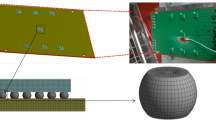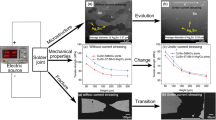Abstract
With the increasing portability and miniaturization of modern-day electronics, the mechanical robustness of these systems has become more of a concern. Existing standards for conducting mechanical durability tests of electronic assemblies include bend, shock/drop, vibration, and torsion. Although these standards provide insights into both cyclic fatigue and overstress damage incurred in solder interconnects (widely regarded as the primary mode of failure in electronic assemblies), they fail to address the impact of time- dependent (creep) behavior due to sustained mechanical loads on solder interconnect durability. It has been seen in previous studies that solder durability under thermal cycling loads is inversely proportional to the dwell time or hold time at either temperature extreme of the imposed temperature cycle. Fatigue life models, which include dwell time, have been developed for solder interconnects subject to temperature cycling. However, the fatigue life models that have been developed in the literature for solder interconnects under mechanical loads fail to address the influence of the duration of loading. In this study, solder interconnect test vehicles were subjected to cyclic mechanical bending with various dwell times in order to understand the impact of the duration of mechanical loads on solder interconnect durability. The solder interconnects examined in this study were formed with 2512 resistor packages using various solder compositions [tin–lead (Sn-Pb) and 96.5Sn-3Ag-0.5Cu (SAC305)]. To evaluate the impact of dwell time, the boards were tested with 0 s, 60 s, and 300 s of dwell time at both extremes of the loading profile. It was observed that an increase in the dwell time of the loading profile resulted in a decrease in the characteristic life of the solder interconnects. The decrease in fatigue life was attributed to increased creep damage as identified using finite-element simulations. An energy partitioning approach was then used to estimate the mean cycles to failure for the various testing conditions. The estimated mean cycles to failure were within 10% of the experimentally obtained mean cycles to failure.
Similar content being viewed by others
References
I. Kim and S.B. Lee, IEEE Trans. Compon. Packag. Technol. 31, 478 (2008).
J.H.L. Pang and F.X. Che, J. Electron. Packag. 129, 496 (2007).
S. Shetty, V. Lehtinen, and A. Dasgupta, J. Electron. Packag. 123, 302 (2001).
A. Skipor and L. Leicht, in Proceedings of the Electronic Components and Technology Conference, 2001.
Y.S. Lai, T.H. Wang, H.H. Tsai, and M.H.R. Jen, Microelectron. Reliab. 47, 111 (2007).
S. Shetty and T. Reinikainen, J. Electron. Packag. 125, 556 (2003).
L.L. Mercado, B. Phillips, S. Sahasrabudhe, J.P. Sedillo, D. Bray, E. Monroe, K.J. Lee, and G. Lo, in Proceedings of the Electronic Components and Technology Conference, 2004.
C.L. Coq, A. Tougui, M.P. Stempin, and L. Barreau, Microelectron. Reliab. 50, 1007 (2010).
IPC Standard, IPC-9701, in Performance Test Methods and Qualification Requirements for Surface Mount Solder Attachments, 2002.
Y. Zhou, and A. Dasgupta, in Proceedings of the ASME International Mechanical Engineering Congress and Exposition, 1, 2007.
Y. Zhou, M. Al-Bassyiouni, and A. Dasgupta, IEEE Trans. Compon. Packag. Technol. 33, 319 (2010).
S. Knecht and L.R. Fox, IEEE Trans. Compon. Hybrids Manuf. Technol. 13, 424 (1990).
R. Mahmudi, A. Rezaee-Bazzaz, and H.R. Banaie-Fard, J. Alloy. Compd. 429, 192 (2007).
H. Ma, J. Mater. Sci. 44, 3841 (2009).
J.K. Shang, Q.L. Zeng, L. Zhang, and Q.S. Zhu, Lead-Free Electronics Solders, 211 (2006).
C. Kanchanomoi, Y. Miyashita, and Y. Mutoh, J. Electron. Mater. 31, 142 (2002).
A. Dasgupta, C. Oyan, D. Barker, and M. Pecht, J. Electron. Packag. 144, 152 (1992).
L.J. Ladani, Microelectron. Eng. 87, 201 (2010).
R. Darveaux and K. Banerji, IEEE Trans. Compon. Hybrids Manuf. Technol. 15, 1013 (1992).
S. Verma, A. Dasgupta, and D. Barker, Trans. ASME 115, 416 (1993).
L.J. Ladani and A. Dasgupta, J. Electron. Packag. 129, 273 (2007).
A.J. Rafanelli, J. Electron. Packag. 114, 234 (1992).
P. Lall, S. Shantaram, J. Suhling, and D. Locker, in Proceedings of the Electronic Components and Technology Conference, 2012.
M. Osterman and A. Dasgupta, Lead-Free Electronics Solders, 229 (2007).
G. Cuddalorepatta, M. Williams, and A. Dasgupta, J. Electron. Mater. 39, 2292 (2010).
Author information
Authors and Affiliations
Corresponding author
Rights and permissions
About this article
Cite this article
Menon, S., Osterman, M. & Pecht, M. Evaluating the Impact of Dwell Time on Solder Interconnect Durability Under Bending Loads. J. Electron. Mater. 44, 4549–4556 (2015). https://doi.org/10.1007/s11664-015-3931-1
Received:
Accepted:
Published:
Issue Date:
DOI: https://doi.org/10.1007/s11664-015-3931-1




